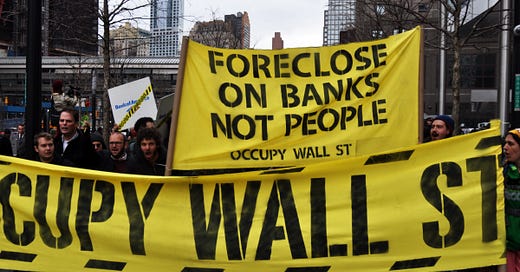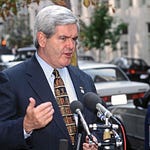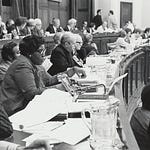
This episode begins with an exchange between Vermont Senator Bernie Sanders CNN’s Anderson Cooper during the Democratic Presidential candidates’ debate in Las Vegas, NV, on October 13, 2015. At the time, Sanders was in what turned out to be a close race with Hillary Clinton for the 2016 nomination, a contest that Clinton ultimately won.
While some blamed a primary battle that went deep into the spring campaign season for Clinton’s ultimate loss to Donald Trump in November 2016, there is a better way to look at Sanders’ epic run. No self-declared socialist had made such a mark on a presidential cycle since Eugene Debs won almost a million votes as the Socialist Party of America candidate in the 1920 election. And imagine how well Debs might have done had he not been incarcerated in federal prison.
Sanders was, and is, a lifetime socialist. He was first elected to Congress from Vermont’s at large district in 1990, and he made the jump to the Senate in 2006. He’s very popular where I live in New England. It’s not because those states are socialist, as the Republican Party would tell you, but because he has consistently championed the interests of all working people. “Bernie has my vote,” said one blue collar guy who answered the door in southern New Hampshire when I was canvassing for Elizabeth Warren in 2020. “Whenever there’s a strike around here, he walks the picket line with us.”
Lots of Democratic Senators back labor, of course. But how many mainstream politicians are willing to say that capitalism is broken? That we need the state to safeguard all workers from exploitation by providing a living wage, nutritious food, Medicare for all, safe working conditions, childcare, the right to unionization, affordable housing and food, renewable energy, and free education? That it is an affront to human decency to allow banks, hedge funds, and corporations to poison the environment, turn all labor into piecework, and financialize the basic necessities that all humans need to live?
Perhaps what the 2016 Sanders campaign said most clearly to Americans was: we have choices. In a democratic system, we don’t have to allow corporations to run our lives, make us work harder for less, profit from poverty, siphon those profits upwards, and pay no taxes. And the moments where that clarity has come to more people are coming faster and faster: the 1999 World Trade Organization protests in Seattle; the 2011 takeover of Zuccotti Park in lower Manhattan by Occupy Wall Street that launched a global anti-capitalist protest; a resurgence of Democratic Socialists of America after 2013, that is credited with the emergence of millennial socialism. Many of those young people swelled the ranks of Black Lives Matter, which took to the streets in the summer of 2020 to put racism back on the national agenda.
In all of these movements, activists and intellectuals worked to expand the socialist vision by weaving critical race, feminist, indigenous, queer, labor, and climate politics together to help us learn how to stand as one to make a better—and some might argue, even survivable—world. And yes, Bernie Sanders lost not one, but two, bids to become president—but in the wake of those campaigns, his supporters have mobilized to elect socialists, usually running as Democrats, to local, state, and national office.
One of Karl Marx’s most famous lines from his 1848 blockbuster, The Communist Manifesto, was: “The proletarians have nothing to lose but their chains. They have a world to win.” We do have a world to win, and what we need is a road map.
Which is why I asked my colleague, New School for Social Research political theorist Nancy Fraser, to come on the show to talk about her book, Cannibal Capitalism: How our System is Devouring Democracy, Care, and the Planet – and What We Can Do About It, out last fall from Verso Books.
Program notes:
The opening clip is taken from a 2016 exchange between CNN’s Anderson Cooper and Vermont Senator Bernie Sanders at the Democratic Presidential candidates’ debate in Las Vegas, NV, on October 13, 2015.
In the introduction, Claire namechecks Eugene Debs as the first major socialist candidate for President of the United States. To learn more, go to Nick Salvatore, Eugene V. Debs: Citizen and Socialist (University of Illinois Press, 2007)
Nancy talks about the increased role of animal-human virus transfer in global pandemics. The New Yorker’s Matthew Hutson wrote about this phenomenon in September, 2022.
Listeners who are interested in learning more about Karl Polanyi, a strong influence on Nancy’s analysis of contemporary capitalism, may wish to start with The Great Transformation: The Political and Economic Origins of Our Time, first published in 1944.
In the discussion about exploitation, Claire mentions' Caroline Fraser’s Pulitzer Prize-winning Prairie Fires: The American Dreams of Laura Ingalls Wilder (Henry Holt, 2017), which includes a lengthy description of how white farmers were driven into bankruptcy in the 19th century by being lured onto, and destroying, the North American prairie. Nancy also recommends William Cronon’s Nature’s Metropolis: Chicago and the Great West (W.W. Norton, 1991) as a second example of how capital accumulation and environmental degradation work hand-in-hand.
For more on how the exploitation of labor drives white supremacist political movements, listeners may want to read David Roediger, The Wages of Whiteness: Race and the Making of the American Working Class (Verso, 1991).
Nancy mentions another book, co-authored with Cinzia Arruzza and Tithi Bhattacharya, that explores the ideas we discussed today specifically in relation to feminist politics: Feminism for the 99%: A Manifesto (Verso, 2019).
Listeners interested in how the idea of “essential workers” illuminated the nature of our economy during and after the worst months of the Covid-19 pandemic might want to read Kim Kelly, “Covid 'essential' workers were always important. Don't abandon them post-pandemic,” The New Republic (April 9, 2021)
Do you have ideas about how we can make the world we want to work, live, and love in? Then:
You can download this podcast here or subscribe for free on Apple iTunes, Spotify, Google Podcasts, or Soundcloud.













Share this post